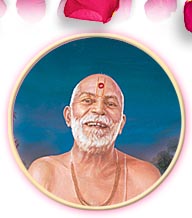|
Ame
Sau Swamina Balak....
We are the children of Swami we will die for him. We are the youths of Shriji Maharaj; we will fight for him. We are fearless; we will not shirk sacrificing our lives, for we are born to die. We have launched this movement, and will undergo any suffering. We will sing the praises of Akshar Purushottam. We are the sons of Shriji, we have our abode in Akshar. Consecrated as we are to swadharma, we have no apprehension whatsoever. Bhagwan Purushottam and Akshar, Gunatitanand Swami, are with us. We have accomplished our goal.
A
Agna
= Instruction, order, command
Akshar = In his personal form, Akshar serves Purushottam in his abode, Akshardham, and manifests as his ideal devotee, the Satpurush, on earth
Amli-pipli = Popular Indian game for children
Arti = Hindu ritual of waving lighted wicks before the murti of God as an act of worship
Asan = Seat; one of the eight steps in yoga
Asat = Untruthful, false
B
Babul = Medicinal stick used for brushing teeth
Bhagwati diksha = Initiation into the sadhu-fold
Brahmacharya =Divine conduct. Celibacy. For renunciants brahmacharya has been prescribed as eight-fold abstinence from associating with the opposite gender in the following ways:
(1) shravanam – listening to or of
(2) keertanam – talking to or of
(3) keli – frolicking with
(4) prekshanam – intentionally looking at
(5) guhyabhãshanam – privately conversing with
(6) sankalpa – fantasising about
(7) adhyavasãya – thinking of
(8) kriyã – intercourse with
For householder males, brahmacharya constitutes renouncing all women except their wives, abstaining from sexual relations with one’s wife on days of observance, and engaging in sexual relations with her only during the appropriate times
Brahmavidya = Spiritual knowledge
C
Chandlo = Auspicious vermillion mark applied on forehead
Charnarvind = Respectful term used to refer to the holy feet of God or other spiritually elevated person
Cheshta = Verses sung before bedtime describing the daily routine and glory of Shriji Maharaj
D
Dal = Spicy soup of dissolved pulses
Derasar = Jain place of worship
Divo = A lighted wick in an earthen or metal crucible filled with ghee
E
Ekadashi = 11th day of the bright and dark halves of a lunar month
Ekta = Unity
G
Guna = Quality, innate nature
Gunatit = One who is above the three gunas of rajas, tamas and sattva; above maya
Gurukul = Residential school
I
Indriya = Sense, through which one can ‘know’ and perform actions
J
Jalebi = A sweet delicacy
Jiva = Soul or self with worldly desires
K
Kalash = Sacred pot
Kansar = A sweet delicacy
Kanthi = Double-threaded necklace, usually made of tulsi beads, received by satsangis upon initiation into the Satsang Fellowship, and worn as a sign of their affiliation to God
Karta = Doer. God is the cause of everything that happens
Katha = Spiritual discourse
Kho-Kho = Popular Indian game
Kothar = Storeroom of a mandir
M
Mahapuja = Special worship offered to Bhagwan Swaminarayan, Gunatitanand Swami, muktas, incarnations and deities
Mala = Rosary
Maya = Ignorance, material universe, darkness. One of the five eternal realities. Anything that deviates one from the worship of God
Moksha = A liberated soul
Murti = Sacred icon of God that is worshipped
Murti-Pratishtha = Traditional Vedic ceremony in which murtis, or images, are ritually consecrated in a mandir
N
Niyam = Moral and spiritual disciplines
P
Pagh = Turban
Pan = Made of nagarvel tree leaves and condiments
Paramhansa = Supreme swan. A male sadhu of the highest order, characterised by his ability to discriminate between sat and asat – just as swans were traditionally considered to be able to distinguish between milk mixed with water
Parayan = Spiritual discourses held for several days
Parshad = A renunciant who wears white robes
Parshad diksha = Initiation into the monastic order in which the youth wears white robes
Pradakshina = Circumambulation
Pragat = Manifest
Prasad = Sanctified food, blessed and consecrated by having been offered to God
Puri = A fried delicacy made of wheat flour
R
Rajas = One of the three gunas, having attributes of: activity, restlessness, anger, violence, desire to satisfy the indriyas and extravagance
Ras = A traditional folk dance of Gujarat
Rotla = An unleavened bread
S
Sakar = Sugar crystals
Samp = Unity
Sarvopari = Supreme
Sat = Truth
Sata = A sweet delicacy
Satsang = Divine fellowship
Satsang = The practice of spiritually associating with the Satpurush, fellow satsangis, one’s own atma and the sacred scriptures of the Satsang fellowship
Satsangi = A devotee who practices the vows of Satsang
Sattva = Second of the three gunas, having attributes of: clarity and purity of thought, excellence, mental poise
Satsang = Good company; spiritual association
Satsangi = One who practices satsang
Seva = Service
Shibir = Conferences, training camps
Shikharbaddh = Mandir in which five artis are performed daily and daily worship is performed by sadhus
Sinhasan = Throne for murtis of God or Satpurush
Sud = Bright half of the lunar month
Suhradaybhav = Friendship
Swadharma = One’s own dharma
T
Tamas = Third of the three gunas, having attributes of: inactivity, lethargy, darkness and ignorance
Thal = Devotionally offering food to God
Tilak = Upright U-shaped mark imprinted on the forehead with sandalwood paste
Tumbdi = Gourd
U
Upasana = Sitting near, derived from ‘upa’ + verb-root ‘as’ – meaning to sit near. Philosophical framework outlining the fundamental principles of a doctrine. Philosophical under-standing of the nature of God as well as the mode of worship of God, i.e., how one understands God to be like, and how one worships him
Urdhvarekha = Vertical line on the sole from the toe to the heel signifying spiritual greatness
V
Vad = Dark half of the lunar month
Vartman = Vow
|









